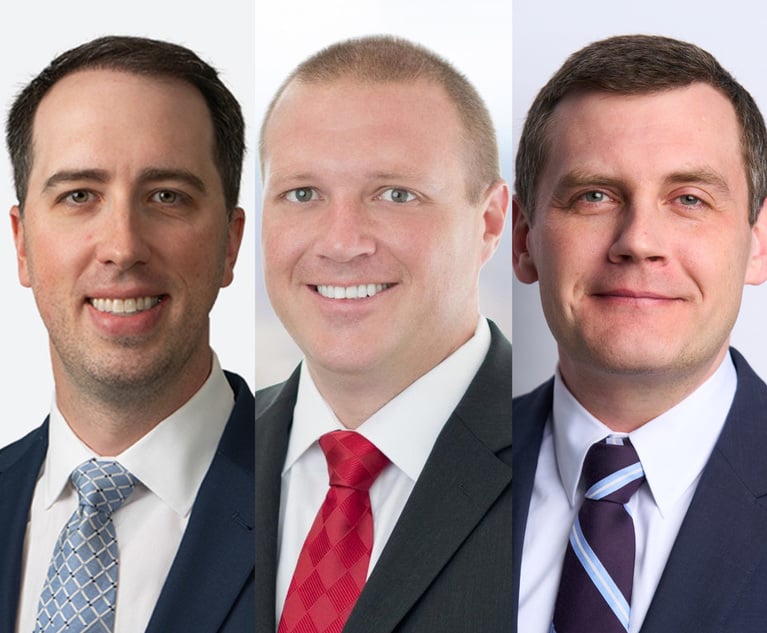Alston Ex-Partner Is Grilled on Stand in Legal Malpractice Trial
The plaintiffs, a family-owned company, say Alston & Bird and former partner Jack Sawyer breached their legal and fiduciary duties by helping an older sibling allegedly steal nearly $1.5 million.
February 14, 2018 at 10:31 AM
7 minute read

Correction noted at bottom.
Day Two of the legal malpractice trial against Alston & Bird was no picnic for former senior partner Jack Sawyer, who spent the day weathering intense questioning about his dealings with the ex-manager accused of looting a family company of $1.5 million and then moving out of state.
Sawyer is accused of allowing Maury Hatcher, the eldest sibling and onetime manager, to circumvent provisions of the company's operating agreement to pay himself inflated fees, to conceal the value of other members' shares and make unauthorized distributions, even as he was preparing to cash out his own shares for an inflated price.

“You were the company lawyer!” boomed lead plaintiffs attorney Harmon Caldwell Jr., displaying letters, emails and other documents he said indicated Sawyer had advised Maury to keep the other members of Hatcher Management Holdings in the dark.
Maury, who managed the company from 2001 until he resigned in 2009, left amid an acrimonious dispute involving his younger brothers, Jerry and Barry, who had themselves voted in as co-managers upon Maury's announced resignation.
But Caldwell said the evidence showed Sawyer continued to work to advance Maury's interests, advising him that he had no duty to tell the other members about their holdings or what Maury was doing until it was too late.
After Maury left for Florida, the company and more than a dozen Hatcher family members sued him in 2009. Maury failed to appear for trial and in 2013 was ordered to pay more than $4 million in a default judgment. He never paid it.
Caldwell said Sawyer spoke to Maury about plans to cash out, and even helped him write a “cease and desist” letter to Jerry and Barry when they told him they had assumed management duties.
“Did you ever tell anybody else?” he asked. “Did you have any contact with the other members?”
Sawyer said his role in the discussions at issue was primarily to advise on tax consequences if the company was liquidated or members sold their shares.
“You're a smart lawyer; you've been around a long time. You know when something like this is going on, don't you?” Caldwell said.
“I was there to answer tax questions,” Sawyer said. “My impression was that [Maury] was a good Christian man. … I was shocked when I found out he had arguably done something he shouldn't.”
Caldwell is representing Hatcher Management with Caldwell, Propst & DeLoach colleagues Harry MacDougald, Jeremy Moeser and Christine Dial,
During opening arguments Tuesday, Caldwell said Jerry and Barry relied on Alston & Bird's prestigious reputation and assumed Sawyer was protecting their interests and those of the other company members when, in fact, he was looking out for Maury.
Sawyer, said Caldwell, deliberately drafted the documents establishing Hatcher Management Holdings to hide the percentage of assets each was due or what Maury paid himself in contravention of standard legal procedure.
When questions were raised, he said Sawyer advised the family that Maury had no legal obligation to share that information.
In the meantime, Maury sold his shares back to the company for an inflated price he came up with by himself and moved to Florida “where debtor protection laws provide haven for crooks,” Caldwell said.
That brought an objection from Alston & Bird's lead lawyer, Robbins Ross Alloy Belinfante Littlefield partner Richard Robbins, and Fulton County Superior Court Judge Craig Schwall ordered the jury to disregard any mention of Florida law.
Schwall ruled the jury can only hear that the company won a judgment against Maury and that he is “unavailable” for the current trial.
Caldwell said emails and a recording of a family meeting with Sawyer provided “clear evidence” Sawyer was providing “inaccurate advice and failed to speak up when Maury said things that were just plain wrong.”
Robbins, handling the case with colleagues Jason Alloy and Jeremy Littlefield, accompanied by Alston & Bird partner Steve Collins, derided the suit as a “made-up story taken from snippets of this and snippets of that” in an effort to have Alston & Bird make up for money Maury received while smearing Sawyer and his former firm.
In fact, he said, Sawyer had helped Jerry and Barry acquire the very corporate books and records Maury was sitting on and provided sound legal advice throughout.
Alston & Bird has argued that any losses the company suffered are due to the actions of nonparties, including Maury and his brothers, and in 2016 the Georgia Court of Appeals ruled that such evidence could be admitted at trial.
“This was a family feud” fueled by acrimony between Maury and his two younger brothers, Robbins said.
The case is “an elaborate thing about why Alston & Bird should be responsible for Maury Hatcher taking all this money. None of it went to Alston & Bird,” he said.
“No good deed goes unpunished,” said Robbins. The firm “got stiffed on their fees, then they got sued.”
Sawyer, who spent 27 years at Alston & Bird before leaving last year, took the witness stand later in the day.
Caldwell grilled the lawyer on the operating agreement he drafted when the company was formed in 2001, claiming Sawyer deleted portions of the standard forms for such documents detailing the percentage and valuation of shares for each member.
Sawyer said he had acted as instructed by Maury, who was the company manager and only Hatcher family member he interacted with from 2001 to 2008.
Sawyer confirmed that he had advised Maury when he and his brothers were exchanging barbed correspondence prior to Maury's stepping down and selling out in 2009.
“Did Maury tell you Jerry was asking a lot of questions?” asked Caldwell. “At some point he told you he wanted to get his brother out of the company, didn't he?”
“I'm not sure about that,” Sawyer said.
On Wednesday, Caldwell said another Alston & Bird partner, Nowell Berreth, whom Sawyer had brought in to consult with around the time Maury was preparing to leave, raised concerns that they may be engaged in a conflict by continuing to represent Maury after he resigned, even asking in an email who their client was.
“I believed we were representing the company's interests,” Sawyer said.
He also said Maury told him he thought some of the member ballots naming Jerry and Barry co-managers might have been forged.
“I was operating under the impression that some of the signatures may not have been valid,” he said.
This story has been changed to correct two errors: Jack Sawyer was initially reported to be a co-defendant in the ongoing trial; he is not, only Alston & Bird is the defendant. Also, the amount of the 2013 default judgment against Maury Hatcher was initially misreported as more than $400,000; it was $4 million.
This content has been archived. It is available through our partners, LexisNexis® and Bloomberg Law.
To view this content, please continue to their sites.
Not a Lexis Subscriber?
Subscribe Now
Not a Bloomberg Law Subscriber?
Subscribe Now
NOT FOR REPRINT
© 2024 ALM Global, LLC, All Rights Reserved. Request academic re-use from www.copyright.com. All other uses, submit a request to [email protected]. For more information visit Asset & Logo Licensing.
You Might Like
View All

Fowler White Burnett Opens Jacksonville Office Focused on Transportation Practice
3 minute read
On The Move: Polsinelli Adds Health Care Litigator in Nashville, Ex-SEC Enforcer Joins BCLP in Atlanta
6 minute read
Woman's Suit Alleging Negligence to Sex Trafficking by Hotel Tossed by Federal Judge
Trending Stories
- 1Jefferson Doctor Hit With $6.8M Verdict Over Death of 64-Year-Old Cancer Patient
- 2Seven Rules of the Road for Managing Referrals To/From Other Attorneys, Part 1
- 3What Went Wrong With Adeel Mangi's Long, Strange Trip Through the Judicial Nomination Process?
- 4Defense Counsel Turns $2.2 Million Broward Jury Verdict to $500K
- 5United Soccer League Scores General Counsel
Who Got The Work
Michael G. Bongiorno, Andrew Scott Dulberg and Elizabeth E. Driscoll from Wilmer Cutler Pickering Hale and Dorr have stepped in to represent Symbotic Inc., an A.I.-enabled technology platform that focuses on increasing supply chain efficiency, and other defendants in a pending shareholder derivative lawsuit. The case, filed Oct. 2 in Massachusetts District Court by the Brown Law Firm on behalf of Stephen Austen, accuses certain officers and directors of misleading investors in regard to Symbotic's potential for margin growth by failing to disclose that the company was not equipped to timely deploy its systems or manage expenses through project delays. The case, assigned to U.S. District Judge Nathaniel M. Gorton, is 1:24-cv-12522, Austen v. Cohen et al.
Who Got The Work
Edmund Polubinski and Marie Killmond of Davis Polk & Wardwell have entered appearances for data platform software development company MongoDB and other defendants in a pending shareholder derivative lawsuit. The action, filed Oct. 7 in New York Southern District Court by the Brown Law Firm, accuses the company's directors and/or officers of falsely expressing confidence in the company’s restructuring of its sales incentive plan and downplaying the severity of decreases in its upfront commitments. The case is 1:24-cv-07594, Roy v. Ittycheria et al.
Who Got The Work
Amy O. Bruchs and Kurt F. Ellison of Michael Best & Friedrich have entered appearances for Epic Systems Corp. in a pending employment discrimination lawsuit. The suit was filed Sept. 7 in Wisconsin Western District Court by Levine Eisberner LLC and Siri & Glimstad on behalf of a project manager who claims that he was wrongfully terminated after applying for a religious exemption to the defendant's COVID-19 vaccine mandate. The case, assigned to U.S. Magistrate Judge Anita Marie Boor, is 3:24-cv-00630, Secker, Nathan v. Epic Systems Corporation.
Who Got The Work
David X. Sullivan, Thomas J. Finn and Gregory A. Hall from McCarter & English have entered appearances for Sunrun Installation Services in a pending civil rights lawsuit. The complaint was filed Sept. 4 in Connecticut District Court by attorney Robert M. Berke on behalf of former employee George Edward Steins, who was arrested and charged with employing an unregistered home improvement salesperson. The complaint alleges that had Sunrun informed the Connecticut Department of Consumer Protection that the plaintiff's employment had ended in 2017 and that he no longer held Sunrun's home improvement contractor license, he would not have been hit with charges, which were dismissed in May 2024. The case, assigned to U.S. District Judge Jeffrey A. Meyer, is 3:24-cv-01423, Steins v. Sunrun, Inc. et al.
Who Got The Work
Greenberg Traurig shareholder Joshua L. Raskin has entered an appearance for boohoo.com UK Ltd. in a pending patent infringement lawsuit. The suit, filed Sept. 3 in Texas Eastern District Court by Rozier Hardt McDonough on behalf of Alto Dynamics, asserts five patents related to an online shopping platform. The case, assigned to U.S. District Judge Rodney Gilstrap, is 2:24-cv-00719, Alto Dynamics, LLC v. boohoo.com UK Limited.
Featured Firms
Law Offices of Gary Martin Hays & Associates, P.C.
(470) 294-1674
Law Offices of Mark E. Salomone
(857) 444-6468
Smith & Hassler
(713) 739-1250






